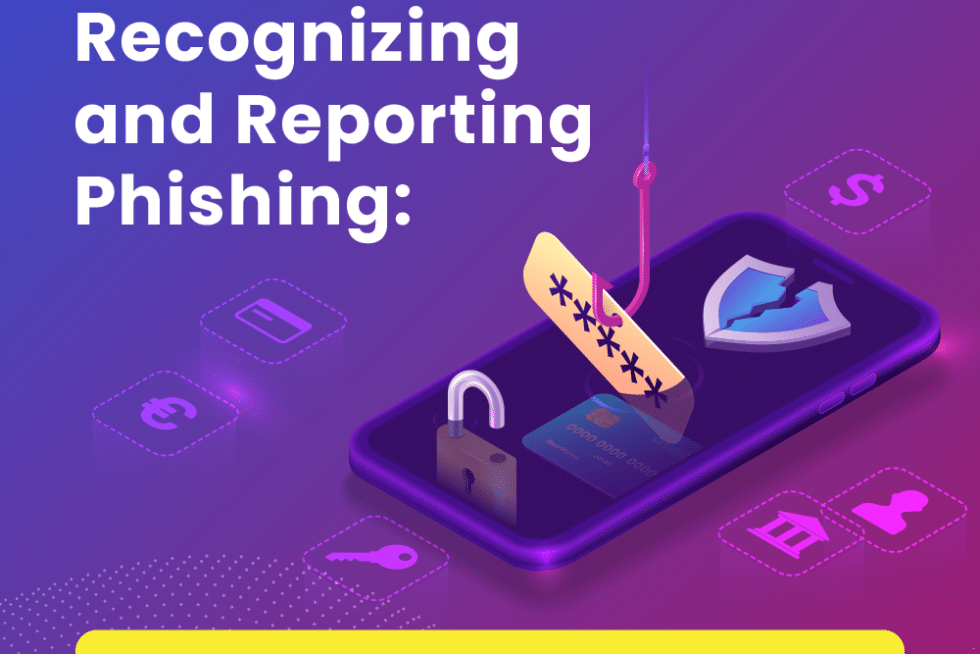Week 3 of Cyber Security Awareness Month is here! Today, we are going to talk to you about a topic that affects us all – phishing. We spend a significant amount of our lives online, it’s crucial to be aware of the dangers lurking in our inboxes. So, let’s dive into the importance of recognizing and reporting phishing attacks and learn how to protect ourselves from these devious scams.
What is Phishing?
Phishing (pronounced “fishing”) refers to a fraudulent attempt by cybercriminals to obtain sensitive information such as usernames, passwords, credit card details, or even your identity. They do this by posing as trustworthy entities through email or other communication channels.
Common Signs to Identify Phishing Attacks:
- Suspicious Sender: Pay attention to the email address of the sender. Cybercriminals often create fake accounts that closely resemble legitimate organizations.
- Urgency and Threats: Phishers try to induce panic or fear by using urgent language or threats to trick you into taking immediate action.
- Poor Grammar and Spelling: Many phishing emails contain grammatical errors, misspellings, or awkward language that should raise suspicions.
- Generic Greetings: Legitimate organizations usually address you by name in their emails. Be cautious if you receive generic greetings like “Dear Customer” or “Hello User.”
- Unexpected Attachments or Links: Do not open any attachments or click on suspicious links without verifying their authenticity first.
- Unusual Requests for Personal Information: Reputable institutions will never ask for personal information via email. Be wary if an email asks for passwords, social security numbers, or financial details.
- Unsecured Websites: Check if the website requesting your information has a secure connection (https://) before entering any sensitive data.
- Too Good to Be True: If an email promises incredible rewards, lottery winnings, or unexpected inheritances, it’s most likely a phishing attempt.
Ways to Recognize a Phishing Email:
- Hover over Links: Hover your cursor over a link without clicking on it to reveal the actual URL. Verify if it matches the displayed text.
- Check Email Formatting: Legitimate organizations maintain consistent formatting in their emails. Inspect for any inconsistencies or oddities.
- Verify with the Source: If you receive an email from an organization you trust but something seems off, contact them directly using official contact information to confirm the legitimacy of the email.
- Pay Attention to Domain Names: Cybercriminals often create URLs that resemble legitimate ones but have slight variations. Double-check domain names for authenticity.
- Be Wary of Pop-up Windows: Phishing attempts may use pop-up windows that ask for personal information. Avoid providing any details through these windows.
8 Tips to Prevent Phishing Scams:
- Stay Informed: Educate yourself and your team about phishing attacks regularly. Awareness is key!
- Install Antivirus Software: Use reliable antivirus software that can detect and block phishing attempts.
- Enable Multi-Factor Authentication (MFA): Implement MFA wherever possible as an extra layer of security for your online accounts.
- Keep Software Up-to-Date: Regularly update your operating system, web browsers, and other software to ensure you have the latest security patches.
- Be Cautious with Personal Information: Only provide personal information on secure websites and avoid sharing sensitive data over unsecured networks or phone calls.
- Use Strong Passwords: Create unique and complex passwords for all your accounts, utilizing a combination of letters, numbers, and special characters.
- Enable Spam Filters: Activate spam filters in your email client to help identify and block phishing emails before they reach your inbox.
- Report Phishing Attempts: If you receive a suspicious email, report it to your organization’s IT department or the Anti-Phishing Working Group (APWG) to help protect others from falling victim.
How OCTG Can Help:
At One Click Technology Group (OCTG), we understand the ever-evolving landscape of cyber threats. From providing robust security measures to educating you and your team about phishing attacks, OCTG can help you navigate the digital world with confidence.
Remember, recognizing and reporting phishing attempts is not only crucial for your own safety but also helps protect others from falling victim. Stay vigilant, stay informed, and let OCTG be your trusted partner in securing your digital journey.
Stay safe out there!



